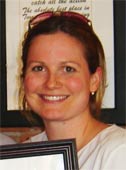Surgical Judgement:
SUMMONING COGNITIVE RESOURCES

Carol-anne Moulton
|
Carol-anne Moulton's MEd research focused on how we teach technical skills to residents,
comparing "massed practice" -- teaching skills all at once in an intensive course
-- to "distributed practice" -- training a little bit each week. The distributed
practice worked better. An interest in surgical judgement was fostered during the
time she spent in the Wilson Centre with frequent impromptu discussions with Glenn
Regehr and Helen MacRae. Judgement has become the focus of her doctoral research.
She feels that we can improve the way surgical judgement is taught. Because they
make decisions at 600 mph, fighter pilots in training spend 15 hours in preparation
and debriefing for every hour in flight. From both an operational and a teaching
point-of-view, it would be valuable to both residents and faculty to spend more
time on preoperative mental rehearsing, imaging and planning, and to debrief postoperatively.
To improve teaching surgical judgement, we must first understand it, so Carol-anne
became interested in deconstructing what is actually meant by the term. Surgeons
use many words -- decision-making, clinical reasoning, problem- solving, judgement,
clinical acumen and intuition -- to describe what they are actually doing when they
are making the right decisions for their patients. The surgeons she has interviewed
find it difficult to describe what they mean by good surgical judgement, but they
know it when they see it in a surgical resident.
In order to deconstruct what it is that surgeons "see", she observed hepatobiliary
surgeons in the operating room. She concludes that it comes down to "the moment
of slowing down when you should", a metaphor for focusing, for summoning additional
cognitive resources. She is currently interviewing surgeons about what they experience
in those "slowing down" moments when there is a transition from automatic to effortful
mode.
Part of slowing down when you should is recognizing that there is an issue to be
addressed, what Carol-anne calls "situation awareness". There are three levels of
situation awareness: one, perception of stimuli (radar blips); two, understanding
the stimuli (enemy planes); and three, projection of what this will mean in the
future (call for help).
|
Decision-making follows this picturing of the environment. A bad decision is often the result of having a poor picture of the environment,
rather than poor decision-making skills. Most errors in the aviation industry are
not decision-making errors, but errors in situation awareness.
Carol-anne observes that we usually don't allow residents to reach that uncomfortable
feeling when there is a problem, through their own situation awareness. Instead
of allowing residents to slow down and work things through, faculty often override
trainees' misreading of the environment to speed them up. Residents don't always
see the same cues, but if faculty surgeons are more explicit about what cues they
are reading, residents will have more of an opportunity to learn situation awareness.
You are more likely to become aware of cues that you anticipate.
The capacity to slow down when you should is not necessarily something that comes
with expertise. A resident may have the capacity while a faculty member does not.
Carol-anne defines expertise as a process of engaging in your environment and effortful
reflection, rather than achieving a certain status or level. By deconstructing what
is meant by judgement, it might be possible to evaluate and remediate when judgement
is lacking. She is working with cognitive psychologist Glenn Regehr, qualitative
analyst Lorelei Lingard, and surgeon Helen MacRae.
Carol-anne was born in Canada, but moved to Australia with her parents in Grade
11. She joined the staff at Toronto General Hospital as a hepatobiliary surgeon
in September 2006. She finds the system in Toronto quite different from her experience
as a trainee in Australia where the emphasis was almost exclusively clinical. She
completed her MD at Melbourne University and surgery residency at the Austin Hospital
in Melbourne. Her academic work began in Toronto during a fellowship in 2003. From
2004-2005 she did a Masters in Education with Richard Reznick; she began work on
her PhD in 2006. She has three children, Jackson, 5, Connor, 3 and Kennedi, 1. Her
husband Daryl is currently a full-time dad, enabling her to be at work at 7am when
needed. Carol-anne and her colleagues Sean Cleary, Alice Wei and Steve Gallinger
have created a group practice with a "one in four" call system, in which each does
intensive clinical work for one week and research for three.
M.M.
|